China's auto exports surge, carmakers expand business globally

NANNING -- SAIC General Motors Wuling Motor Indonesia, a local subsidiary owned by major Chinese automobile manufacturer SAIC-GM-Wuling (SGMW) in Indonesia, rolled out a new energy vehicle (NEV) named Wuling Air EV at its production base in Bekasi this week, according to the company.
SGMW, a joint venture between SAIC Motor, General Motors and Liuzhou Wuling Motors, is based in Liuzhou, South China's Guangxi Zhuang autonomous region.
In 2017, with a total investment of $1 billion, SGMW's manufacturing base in Bekasi City, in West Java Province of Indonesia, was put into operation. Covering an area of 60 hectares, the base has now been developed into an auto industrial park, which involves a complete auto industrial chain.
"After five years of operation, Wuling has become one of the best-selling Chinese auto brands in Indonesia," said Han Dehong, deputy general manager of SAIC General Motors Wuling Motor Indonesia.
Besides, launching the NEV will provide more high-quality auto products and services for Indonesians, and expanding business internationally is an important strategy for SGMW's development, Han added.
According to SGMW, in the first half of this year, car sales of SAIC General Motors Wuling Motor Indonesia reached 11,261 units, up 3 percent year-on-year. As of June, the company has sold a total of more than 88,000 vehicles in the country.
Indonesia is the largest economy in Southeast Asia and has a relatively young population, making it a dynamic auto market with huge potential, said Han.
In recent years, thanks to the improved competitiveness of Chinese auto products, the country's auto brands have gained more recognition in the global market, and many Chinese auto manufacturers have strengthened their "going out" strategy and accelerated their global expansion.
In 2021, China exported over 2 million vehicles, up more than 100 percent year-on-year, said Cui Dongshu, secretary-general of the China Passenger Car Association.
"Despite the impact of the COVID-19 pandemic, the year-on-year growth of China's auto exports in the first half of this year still surged, showing the strong resilience of China's auto industry chain," Cui added.
Meanwhile, NEVs have become the highlight of China's exported vehicles. Data from the China Association of Automobile Manufacturers (CAAM) showed that from January to June this year, the country exported over 200,000 NEVs, a year-on-year increase of 130 percent.
XPeng, a major player in the NEV market in China, has opened four stores in the European market. While in 2021, Chinese electric car maker NIO introduced its NEV model ES8 to Norway.
Furthermore, BYD, another leading electric vehicle manufacturer in China, announced its foray into the Japanese passenger car market, and unveiled three models, at a press conference in Tokyo earlier this year.
The expansion of China's NEV makers to the overseas market, especially the European market, marks a breakthrough for the companies, said Cui.
Currently, many international auto giants are seeking to cash in on the fast-growing NEV market, which heralds the global electric car era, said Xu Haidong, deputy chief engineer of the CAAM.
SGMW will enhance efforts in the global NEV market expansion, said Wang Weisen, deputy general manager of SGMW's sales company.
With Indonesia as the center, the company will strive to expand its business to other regions and countries such as Europe and Japan, to establish the global competitiveness of Wuling NEV products, Wang added.

